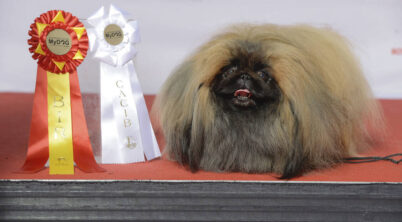Pekingese dogs, with their long, flowing coats and distinctive flat faces, are a breed renowned for their regal and affectionate nature. However, owners often encounter a common issue in these dogs: itchy skin. Itchy skin in Pekingese can significantly impact their quality of life, leading to continuous scratching or licking, which may cause further irritation or even secondary infections.
The causes for itchy skin in Pekingese range from environmental allergies to dietary insufficiencies or underlying health problems. Seasonal pollen, household cleaners, or even certain food ingredients can provoke an allergic reaction leading to discomfort. Additionally, skin issues may be exacerbated by the breed’s thick double coat, which can trap heat and moisture, creating a habitat for yeast or bacterial growth that further irritates the skin.
Addressing itchy skin in Pekingese requires a multifaceted approach. First, identifying the root cause is critical, whether it’s an allergen in their environment or a component of their diet. Once the cause is determined, steps can be taken to alleviate the symptoms and prevent recurrence, such as implementing a dietary change, optimizing grooming routines, or seeking veterinary care for tailored treatments like medicated shampoos or anti-inflammatory medications.
Table of Contents
Understanding Itchy Skin in Pekingese
Pekingese dogs often experience discomfort from itchy skin due to various causes ranging from parasites to allergies. Recognizing the sources and manifestations is crucial for providing relief.
Common Causes of Itching
- Allergies: These can stem from:
- Environmental allergens like pollen, dust mites, and mold
- Food allergies to common ingredients such as wheat, chicken, or soy
- Parasites:
- Fleas and mites are leading culprits behind itchy skin
- Skin Infections:
- Bacterial or fungal infections can exacerbate itchiness
Signs and Symptoms of Skin Issues
- Itchiness: Pekingese will often scratch or bite at their skin
- Skin Changes: Look for:
- Redness
- Inflammation
- Recurrent ear infections
- Visible Distress: Excessive scratching, licking, or biting at skin areas indicates discomfort
By addressing these causes appropriately, the itchy skin conditions commonly seen in Pekingese can be managed effectively.
Treatment Options
Effective management of itchy skin in Pekingese dogs can be achieved through a combination of professional veterinary care, appropriate medications and supplements, and carefully selected home remedies.
Veterinary Care
A veterinarian should be the first point of consultation to diagnose the underlying cause of itching. They may conduct allergy testing or provide treatments for parasites which are frequent irritants. With their guidance, owners can implement a targeted approach to alleviate their dog’s discomfort.
Medications and Supplements
Medications such as antihistamines and steroids can be prescribed by vets to reduce inflammation and itching. In addition, supplements like fish oil, which is rich in omega-3 fatty acids, and probiotics can help bolster a dog’s skin health and overall immune response.
- Anti-inflammatory Properties: Certain supplements have anti-inflammatory properties that may help reduce skin irritation.
- Salmon oil and Fish Oil: These supplements are beneficial sources of omega-3 fatty acids, supporting skin health.
- Probiotics: Probiotics can aid in maintaining a healthy gut flora, which is linked to improved skin conditions.
Home Remedies
Some owners find success with home remedies that include natural ingredients known for their skin-soothing properties.
- Apple Cider Vinegar: Diluted apple cider vinegar can act as a mild disinfectant for cleaning itchy spots.
- Coconut Oil: When applied topically, coconut oil can hydrate the skin and reduce flakiness.
- Quercetin: This naturally occurring antioxidant has been shown to have anti-inflammatory effects.
- Colloidal Oatmeal Bath: A colloidal oatmeal bath can provide immediate relief from itching and help to heal dry skin.
Owners should always consult with their veterinarian before starting any home remedies to ensure they are safe and suitable for their Pekingese’s specific condition.
Prevention and Management
When tackling itchy skin in Pekingese dogs, a multi-faceted approach involving diet, grooming habits, and environmental control is essential. Proper management not only soothes discomfort but also prevents further skin issues.
Diet and Nutrition
Pekingese dogs benefit greatly from a balanced diet rich in natural ingredients. Ingredients such as salmon provide omega-3 fatty acids which can help maintain healthy skin and reduce inflammation. Incorporating grains or grain-free options, depending on the dog’s specific dietary needs, should be considered carefully to ensure they do not exacerbate skin issues.
- Key Nutrients:
- Omega-3 Fatty Acids: Salmon, flaxseed
- Antioxidants: Blueberries, sweet potatoes
- Fiber: Brown rice, barley
Grooming and Skin Care
Regular grooming is imperative for Pekingese dogs to keep their skin healthy. A monthly bath with a shampoo formulated for sensitive skin can remove irritants without stripping natural oils. Look for products without harsh chemicals that can cause or exacerbate skin irritation.
- Grooming Must-Haves:
- Hypoallergenic Shampoo
- Soft-bristle brush
- Detangling spray
Environmental Control
Managing the environment plays a crucial role in preventing and controlling itchy skin. Pekingese can be prone to environmental allergies, so reducing exposure to irritants such as pollen, dust, and mold is beneficial. Frequent cleaning of bedding and play areas minimizes contact with these allergens.
- Environmental Strategies:
- Use air purifiers to reduce airborne allergens.
- Regularly wash dog bedding in hypoallergenic detergent.
- Transition to natural cleaning products in the home to reduce chemical exposure.
Recognizing Secondary Health Issues
When a Pekingese dog exhibits itchy skin, it’s important to look beyond the immediate discomfort to identify any potential secondary health issues. Itchy skin can lead to complications and may be indicative of underlying health concerns that require attention.
Complications of Itchy Skin
Persistent scratching and biting at itchy areas can create wounds, which may become infected. Bacterial infections and yeast infections are common risks for dogs with itchy skin. The presence of scabs or raw areas can further aggravate the skin, leading to a cycle of itching and scratching that prevents healing and can weaken the immune system.
- Secondary Skin Infections: Open wounds are susceptible to infections, worsening the animal’s discomfort and prolonging recovery.
- Dermatitis: Chronic scratching may induce dermatitis, which is an inflammation of the skin that sometimes involves fluid-filled bumps.
General Health Concerns in Pekingese
Pekingese dogs may suffer from a range of health issues that can be associated with itchy skin. For example, parasites, such as fleas or mites, can cause intense itchiness and contribute to hair loss. Hypothyroidism, an endocrine disorder, may manifest with symptoms like dry skin and hair loss, which also leads to itching.
- Respiratory System: Their brachycephalic nature predisposes them to breathing problems that can aggravate itchy skin conditions, like allergies.
- Autoimmune Disorders: Conditions like autoimmune hemolytic anemia can cause skin symptoms and also impact general health.
- Eye and Heart Disease: Chronic health concerns such as eye problems and heart disease also plague this breed, and the stress from itchiness may exacerbate these conditions.
- Musculoskeletal Issues: Arthritis and disk disease, particularly intervertebral disk disease, are not uncommon in Pekingese, impacting their overall well-being.
It’s important for owners to monitor their Pekingese closely for secondary health issues and consult a veterinarian for comprehensive care.
Support and Resources for Owners
When tackling the issue of itchy Pekingese, owners have various tools and resources at their disposal. From selecting appropriate itch relief products to understanding pet insurance, effective management ensures the well-being of their furry companions.
Choosing the Right Products
A Pekingese owner must assess products based on their efficacy and suitability for dogs with short snouts. Omega-3 supplements, found in items like Norwegian Salmon oil, can help reduce inflammatory responses and soothe itchy skin. Owners can consider adding Quercetin, often termed as “Nature’s Benadryl”, to their dog’s diet to alleviate allergen-induced discomfort. Moreover, products containing colostrum and reishi mushrooms, which contain ganoderic acid, are praised not only for promoting skin health but also for aiding cognitive function. These beneficial supplements improve overall health and ensure better nutrient absorption.
To prevent exposure to toxins, it’s crucial to read product labels and select those with high purity levels. Stores such as Amazon offer a variety of options, but it’s imperative to avoid items with harmful ingredients that can exacerbate allergy symptoms.
Insurance and Healthcare
When it comes to healthcare, owners should consider comprehensive pet insurance plans that cover visits to the vet for allergy-related issues. The right insurance plan eases the financial burden of ongoing medical costs and tests, such as allergen identification and management, which are vital for dogs prone to itchy skin. Regular veterinary consultations lead to the correct diagnosis and treatment, including the administration of mother’s milk during early stages, which is crucial for the proper development of the immune system.
It’s important for owners to discuss the specific needs of their Pekingese with the vet, ensuring special attention is given to breeds with shorter snouts that might require unique care. With attention to these aspects, owners can greatly improve the quality of life for their itchy Pekingese.







